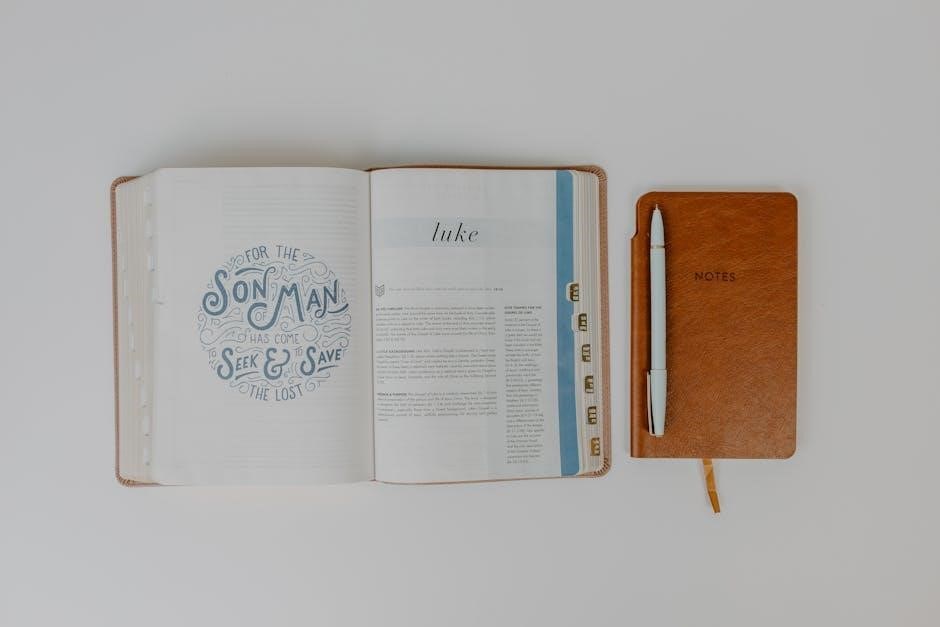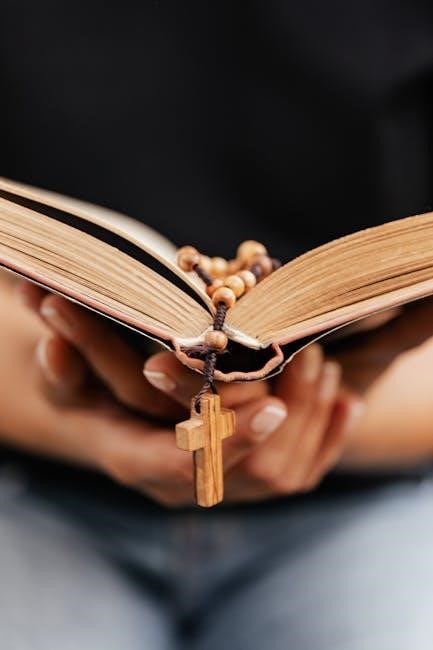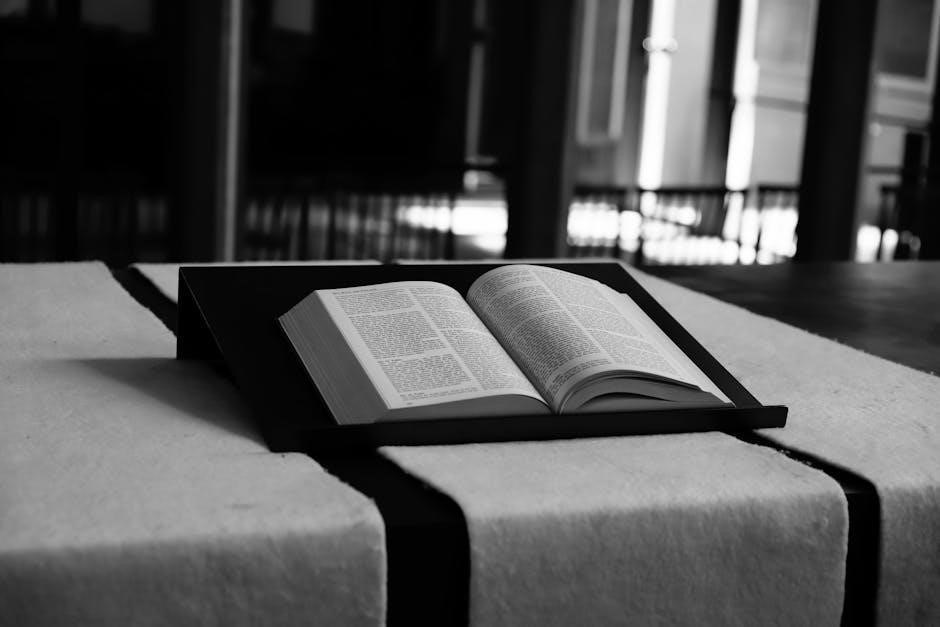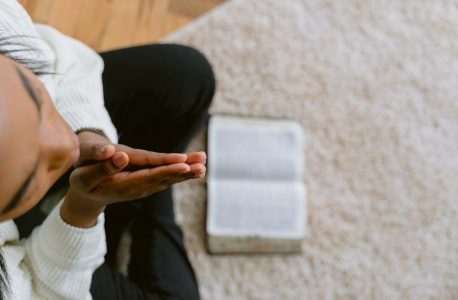Freemasonry and the Bible are deeply connected, with the Bible often serving as a central text in Masonic rituals and teachings. This section explores their historical and symbolic ties, offering insights into moral teachings and the role of scripture in Masonic practices, while also addressing how to find a Freemasonry Bible PDF for further study.
Overview of Freemasonry and Its Connection to Biblical Teachings
Freemasonry, a fraternal organization with spiritual and moral dimensions, often incorporates biblical teachings into its rituals and philosophy. The Bible is frequently used as a source of moral guidance, with many Masonic principles aligning with Christian ethics. Masonic teachings emphasize brotherly love, relief, and truth, mirroring biblical values. Biblical narratives and symbols, such as the Temple of Solomon, are interpreted allegorically to convey moral and spiritual lessons. While Freemasonry is not a religion, it encourages members to reflect on their faith, with the Bible serving as a central text in many lodges. This connection highlights the interplay between Masonic philosophy and biblical wisdom, offering a framework for personal growth and ethical living. The integration of scripture in Masonic practices underscores its enduring influence on the Craft.
Purpose of Exploring Freemasonry Through a Biblical Lens
Examining Freemasonry through a biblical lens provides insight into its moral and symbolic foundations. This approach helps clarify how Masonic teachings align with or differ from biblical principles, offering a deeper understanding of the Craft’s spiritual dimensions. By analyzing scriptural references in Masonic rituals and texts, individuals can explore the ethical frameworks and allegorical interpretations central to Freemasonry. This study also addresses questions about the compatibility of Masonic beliefs with Christian doctrine, fostering dialogue and clarity. For both Masons and non-Masons, this exploration enriches comprehension of Freemasonry’s values and its use of the Bible as a guiding text. It also highlights the significance of the Freemasonry Bible PDF as a resource for further study and reflection.
Historical Context of Freemasonry
Freemasonry evolved from medieval stonemasonry guilds, transitioning into a fraternal organization emphasizing moral and ethical teachings. The Bible was central in early rituals, shaping its philosophical foundations.
Origins and Development of Freemasonry
Freemasonry traces its origins to medieval stonemason guilds, evolving over centuries into a fraternal organization blending craftsmanship with philosophical and moral teachings. The modern era began with the establishment of the first Grand Lodge in London in 1717, marking a shift from practical masonry to speculative, symbolic practices. Early Masonic texts drew inspiration from biblical narratives, incorporating moral lessons and allegorical interpretations. The Bible, particularly the Old Testament, played a central role in rituals, emphasizing virtues like justice, wisdom, and brotherly love. As Freemasonry spread globally, diverse traditions emerged, such as Prince Hall Freemasonry, which addressed racial inclusion. Despite debates over its theological alignment, Freemasonry’s foundational principles remain rooted in universal ethics and the pursuit of self-improvement, reflecting a blend of ancient traditions and modern values.
The Role of the Bible in Early Masonic Rituals and Teachings
The Bible held a central position in early Masonic rituals and teachings, serving as a foundational text for moral and spiritual guidance. Masonic rituals often incorporated biblical narratives, such as the story of King Solomon’s Temple, to convey allegorical lessons about wisdom, justice, and divine order. The Bible was frequently referenced during initiations and ceremonies, with passages used to emphasize virtues like faith, hope, and charity. Early Masonic texts and rituals drew heavily from Old Testament teachings, particularly the Books of Kings and Chronicles, to illustrate moral principles. The Bible’s influence extended beyond symbolism, as it was often used to reinforce ethical codes and fraternal unity. This integration of scripture into Masonic practices reflected the period’s cultural and religious context, where biblical teachings were seen as universal truths. The Bible’s role in early Freemasonry remains a key aspect of its historical identity and spiritual framework.

Core Principles and Teachings of Freemasonry
Freemasonry emphasizes brotherly love, moral integrity, and self-improvement, blending symbolism with biblical teachings to foster ethical living and spiritual growth, reflecting its enduring values and universal principles.
Moral and Ethical Codes in Freemasonry
Freemasonry emphasizes a strong moral and ethical framework, often drawing inspiration from biblical teachings. Central to Masonic philosophy are principles such as brotherly love, relief, and truth, which guide members in their personal and communal lives. The Bible, particularly the King James Version, is frequently referenced in rituals to underscore virtues like honesty, compassion, and integrity. Masonic codes encourage individuals to act with moral responsibility, fostering self-improvement and service to others. While debates exist about the compatibility of Masonic teachings with specific religious doctrines, the ethical foundation remains rooted in universal values; These principles are reinforced through symbolic rituals and allegorical stories, many of which parallel biblical narratives, promoting a path of righteousness and harmony among members.
Symbolism and Allegory in Masonic Texts
Masonic texts are rich in symbolism and allegory, often drawing from biblical narratives to convey moral and spiritual truths. The Bible, particularly the Old Testament, is frequently referenced in Masonic rituals, with stories like the construction of King Solomon’s Temple serving as metaphors for personal and communal growth. Symbols such as the square, compass, and all-seeing eye are used to represent ethical principles and divine guidance. These allegorical interpretations encourage introspection and self-improvement, aligning with Freemasonry’s emphasis on personal development. Many Masonic texts also incorporate biblical imagery to illustrate the journey toward enlightenment, making the Bible a foundational resource for understanding Masonic philosophy. For those interested in exploring these themes, a Freemasonry Bible PDF can provide deeper insights into the symbolic connections between Masonic teachings and scriptural traditions.

The Bible in Freemasonry Rituals and Ceremonies
The Bible plays a central role in Freemasonry rituals and ceremonies, often used for initiation and moral guidance. Its teachings are woven into Masonic practices, and a Freemasonry Bible PDF offers deeper insights into these traditions.
The Use of the Bible in Masonic Initiations
The Bible plays a central role in Masonic initiations, serving as a sacred text that underpins moral and spiritual principles. During rituals, the Bible is often opened to specific passages, such as Psalm 133 for Entered Apprentices, symbolizing unity and brotherly love. Candidates are required to place their hand on the Bible when taking oaths, emphasizing the solemnity and divine nature of the commitment. This practice reflects Freemasonry’s emphasis on truth, morality, and the pursuit of wisdom. The Bible’s presence in initiations is not merely symbolic but integral to the teachings, reinforcing the importance of living according to divine and ethical standards. This tradition highlights the enduring connection between Freemasonry and biblical values, providing a foundation for personal growth and fraternal unity.
Scriptural References in Masonic Rituals
Scriptural references play a significant role in Masonic rituals, with the Bible often being central to teachings and ceremonies. Masonic rituals frequently incorporate verses from the Bible, such as Psalms 133:1-3, which emphasizes unity and brotherhood. These references are used to convey moral lessons and spiritual truths. For instance, the Entered Apprentice degree includes passages from Proverbs 3:13-14, highlighting the importance of wisdom and knowledge. The Bible is not only a symbolic element but also a source of ethical guidance, reinforcing principles like justice, compassion, and faith; While Freemasonry respects diverse religious beliefs, the Bible remains a cornerstone in many Masonic traditions, particularly in Christian-influenced lodges. These scriptural references are integral to the rituals, helping members reflect on their values and duties to others.
The relationship between Freemasonry and Christianity is complex, with some denominations viewing the Craft as conflicting with their faith, particularly regarding oaths and exclusivity, while others remain neutral or accepting.
Views of the Christian Church on Freemasonry
The Christian Church has held varied and often contentious views on Freemasonry throughout history. Many Catholic leaders have historically condemned Freemasonry, viewing it as incompatible with Christian teachings and even labeling it as Satanic. Some Protestant denominations also caution against Masonic membership, citing concerns over secretive rituals and oaths that may conflict with biblical principles. However, not all Christian groups share these views, with some allowing members to join Freemasonry as long as it does not contradict their faith. A central issue for many Christians is the belief that Freemasonry’s emphasis on universal brotherhood and moral teachings may dilute the exclusivity of Christian salvation. Additionally, critics argue that Masonic rituals and symbols, while often incorporating biblical references, may lead members away from orthodox Christian doctrine. These tensions highlight the complex and debated relationship between Freemasonry and Christianity.
Comparisons Between Masonic and Christian Beliefs
While Freemasonry and Christianity share common moral teachings, such as the importance of truth, justice, and brotherly love, there are significant differences in their theological frameworks. Freemasonry emphasizes universal brotherhood and moral improvement, often using biblical scripture to illustrate its principles, but it does not claim to be a religion or a replacement for one. Christianity, on the other hand, centers on the divinity of Jesus Christ and salvation through faith. Some Christian leaders argue that Freemasonry’s oaths and rituals may conflict with biblical teachings, particularly regarding exclusivity of faith. However, Masons often view their fraternity as complementary to, rather than in competition with, religious beliefs. The debate continues, with some seeing Freemasonry as a way to apply Christian values in a broader context, while others view it as incompatible due to its esoteric teachings and symbolism.
Modern Perspectives on Freemasonry and the Bible
Modern perspectives often explore how Freemasonry adapts to contemporary spirituality while maintaining its biblical roots. The Bible remains central, balancing tradition with evolving values and interpretations in today’s diverse world.
Contemporary Debates on Masonic Teachings
Modern discussions about Freemasonry often focus on its compatibility with Christian teachings, particularly regarding exclusivity of salvation and the use of oaths. Some argue that Masonic principles, such as universal brotherhood, align with biblical values, while others criticize certain rituals as conflicting with Christian doctrine. The role of the Bible in Masonic practices remains a focal point, with debates centered on its interpretation and application. Additionally, the question of whether Freemasonry promotes a form of “works-based” salvation, as opposed to grace, continues to spark theological discussions. These debates highlight the complex relationship between Freemasonry and Christianity, urging individuals to explore primary sources, such as a Freemasonry Bible PDF, to form informed opinions. Understanding these contemporary perspectives provides insight into the evolving nature of Masonic teachings and their intersection with religious beliefs.
The Role of the Bible in Modern Masonic Practices
The Bible remains a central element in modern Freemasonry, often used in rituals and ceremonies to emphasize moral and spiritual principles. Many Grand Lodges require passages from the Bible to be read during stated meetings, underscoring its significance as a source of divine truth. In Masonic practices, the Bible is frequently used alongside other sacred texts, symbolizing the universality of moral teachings. Its role extends beyond rituals, as it is seen as a guide for personal reflection and ethical decision-making. Additionally, the availability of a Freemasonry Bible PDF has made it easier for members to study and integrate its teachings into their daily lives. This modern approach ensures that the Bible continues to be a vital tool for spiritual growth and unity within the Masonic community, bridging tradition with contemporary practice.

Resources for Studying Freemasonry and the Bible
Recommended reading includes books like The Midnight Freemasons and On The Masons And Their Lies. Digital archives and online lodges offer Freemasonry Bible PDFs and historical texts for deeper study.
Recommended Reading and Study Materials
For those seeking to deepen their understanding of Freemasonry and its connection to the Bible, several resources are highly recommended. A book titled Freemasonry and the Bible provides an insightful exploration of the topic, blending historical context with modern perspectives. Additionally, The Midnight Freemasons offers engaging discussions on Masonic topics, including biblical influences. For those interested in primary sources, a small blue cipher book found among Masonic paraphernalia can be decoded with the right resources, though its contents remain mysterious. A trivia guide containing 200 questions and answers about Freemasonry is also available for those looking to test their knowledge. To find a Freemasonry Bible PDF, explore Masonic lodge archives or online repositories dedicated to esoteric texts. These materials cater to both newcomers and seasoned Masons, offering diverse perspectives and depth.
How to Find a Freemasonry Bible PDF
Locating a Freemasonry Bible PDF involves exploring various online and offline resources. Start by visiting official Freemasonry websites, such as those of Grand Lodges, which often provide digital versions of Masonic texts. Check online repositories like Archive.org or Google Books for scanned versions of Masonic Bibles. Additionally, Masonic forums and communities may share links to these PDFs. Consider reaching out to local Masonic lodges, as they might have digital libraries or archives accessible upon request. For those interested in historical texts, examining Masonic paraphernalia, such as a small blue book, could offer clues or references. Lastly, consult recommended reading materials, like “Freemasonry and the Bible” or discussions from “The Midnight Freemasons,” which might provide guidance or direct links to the PDF. Ensure to verify the credibility of sources to obtain authentic documents.

Frequently Asked Questions
Brief answers to common inquiries about Freemasonry and its relation to the Bible, including its role in rituals, where to find a Freemasonry Bible PDF, and its compatibility with Christianity.
Common Questions About Freemasonry and the Bible
Many people wonder about the relationship between Freemasonry and the Bible, often asking if the fraternity aligns with Christian teachings or if it replaces scripture with other texts. Others inquire about the Bible’s role in Masonic rituals, such as its use during initiations or ceremonies. A frequent question is whether Freemasonry is compatible with Christianity, given differing views among denominations. Some also ask about the symbolism in Masonic texts and how it relates to biblical allegories. Additionally, there is curiosity about the availability of Freemasonry Bible PDFs for study, as well as the moral codes promoted by the fraternity. These questions highlight the intersections of faith, symbolism, and practice within Freemasonry, offering a pathway to deeper understanding for both members and outsiders.
Addressing Misconceptions and Myths
Freemasonry is often shrouded in myths, with some viewing it as a secretive or even Satanic organization. However, the Bible plays a central role in Masonic rituals, emphasizing moral and ethical teachings. One common misconception is that Freemasonry contradicts Christian beliefs, but many Masons identify as Christians and view their faith as complementary to Masonic principles. Another myth is that Freemasonry requires members to take oaths that conflict with scripture, though many Masons argue that these oaths align with biblical values. Additionally, the idea that Freemasonry hides ancient secrets or promotes paganism is widely debunked, as its teachings focus on universal truths and self-improvement. Understanding Freemasonry through reliable sources, such as a Freemasonry Bible PDF, can clarify these misconceptions and reveal its alignment with biblical principles.

